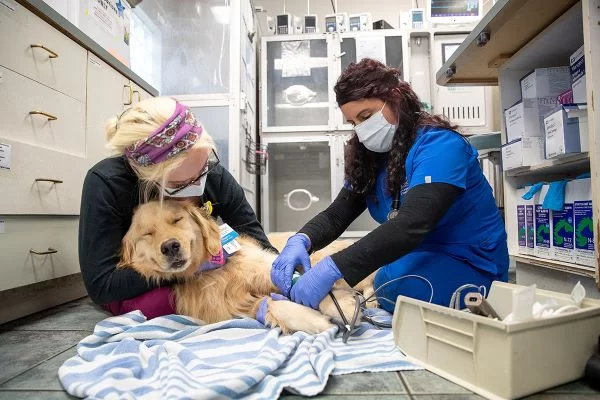What Education Is Needed to Become a Veterinary Technician?
- 1. Introduction: The Role of a Veterinary Technician
- 2. Educational Pathway to Becoming a Veterinary Technician
- 3. Choosing the Right Veterinary Technician Degree Program
- 4. The Importance of Internships and Practical Experience
- 5. Certification and Licensing for Veterinary Technicians
- 6. Career Growth and Specializations for Veterinary Technicians
- 7. Real-Life Example: A Day in the Life of a Veterinary Technician
- 8. Conclusion: Why Becoming a Veterinary Technician Is a Rewarding Career
1. Introduction: The Role of a Veterinary Technician
Becoming a veterinary technician can be a fulfilling and rewarding career. Veterinary technicians, or vet techs, are an essential part of any animal healthcare team, assisting veterinarians with various medical, diagnostic, and surgical tasks. They play a critical role in animal care, from taking vital signs to assisting in surgeries and performing laboratory tests.
However, if you're considering this profession, you may be wondering what education is needed to become a veterinary technician. In this article, we’ll explore the educational requirements, career prospects, and steps you need to take to become a qualified veterinary technician. Whether you're passionate about animals or looking for a stable and impactful career, becoming a veterinary technician might be the right choice for you.
2. Educational Pathway to Becoming a Veterinary Technician
The educational journey to becoming a veterinary technician typically begins with completing a formal educational program accredited by the American Veterinary Medical Association (AVMA) or its equivalent in other countries. Most veterinary technician programs offer an Associate's degree, though some schools provide Bachelor's degrees for those seeking more advanced roles in the field.
For example, a common route is to attend a two-year Associate's degree program in veterinary technology. These programs combine classroom instruction with hands-on clinical experience to equip students with the necessary skills and knowledge to work in veterinary clinics, animal hospitals, and research labs. The coursework generally includes subjects like animal anatomy, pharmacology, medical ethics, and laboratory procedures.
2.1 Prerequisites for Veterinary Technician Programs
Before enrolling in a veterinary technician program, students often need to meet certain prerequisites. These can include high school diplomas or GEDs, along with specific high school coursework in biology, chemistry, and math. Some programs may also require a certain GPA for admission, ensuring that students are prepared for the academic challenges ahead.
3. Choosing the Right Veterinary Technician Degree Program
When choosing a veterinary technician degree program, it’s important to select one that is accredited by a recognized organization, such as the AVMA or the National Association of Veterinary Technicians in America (NAVTA). Accredited programs ensure that the curriculum meets industry standards and prepares students to sit for certification exams.
It’s also essential to consider factors like location, cost, and the availability of hands-on clinical training. Many programs offer internships or clinical rotations as part of the curriculum, providing valuable real-world experience that is crucial for securing employment after graduation.
4. The Importance of Internships and Practical Experience
One of the key components of veterinary technician programs is gaining practical, hands-on experience through internships and clinical rotations. During these internships, students have the opportunity to work directly with animals in a veterinary setting, learning how to assist in exams, prepare animals for surgery, and manage medical records.
Internships are invaluable because they help students apply what they’ve learned in the classroom to real-life situations. Many veterinary clinics and animal hospitals also offer internships to aspiring veterinary technicians, providing an opportunity to build relationships and potentially secure a full-time job after graduation.
5. Certification and Licensing for Veterinary Technicians
After completing an accredited veterinary technician program, graduates must pass a certification exam to become licensed or registered in their state or country. In the United States, this exam is called the Veterinary Technician National Exam (VTNE), which tests students' knowledge and practical skills in veterinary technology.
Once certified, veterinary technicians must maintain their certification by completing continuing education courses to stay up-to-date with the latest advancements in the field. This helps ensure that they provide the best care possible for animals and are prepared for any new challenges that arise in the veterinary industry.
6. Career Growth and Specializations for Veterinary Technicians
Veterinary technicians have several career growth opportunities, including specialization in specific areas of veterinary care. Some techs choose to focus on specialties such as anesthesia, dentistry, or cardiology, often requiring additional training or certification.
As a veterinary technician, you can also take on more leadership roles, such as becoming a supervisor, clinic manager, or educator. These positions typically come with increased responsibilities and higher pay. The veterinary field is expanding rapidly, and veterinary technicians can look forward to a rewarding and diverse career path.
7. Real-Life Example: A Day in the Life of a Veterinary Technician
Take the story of Sarah, a veterinary technician who works in a busy animal hospital. Sarah’s day starts with assisting in routine checkups for pets, administering vaccines, and conducting laboratory tests. Later, she helps prepare an animal for surgery, monitoring anesthesia and assisting the surgeon during the procedure.
Sarah explains, “Becoming a veterinary technician was the best decision I ever made. I love being able to help animals, work alongside compassionate people, and continuously learn. The education and training I received have allowed me to build a fulfilling career where every day is different and rewarding.”
8. Conclusion: Why Becoming a Veterinary Technician Is a Rewarding Career
Becoming a veterinary technician requires dedication, education, and a passion for animal care. With the right training and certification, you can embark on a fulfilling career that allows you to make a difference in the lives of animals and their owners. Whether you are just starting your education or seeking to specialize in a particular field, the path to becoming a veterinary technician offers endless opportunities for growth and advancement.
If you're passionate about animals and want a career in veterinary medicine, now is the perfect time to start your journey. Consider enrolling in a top veterinary technician program and take the first step toward a rewarding and impactful career.












